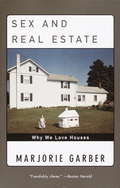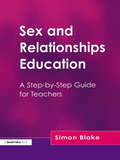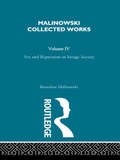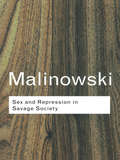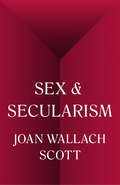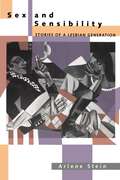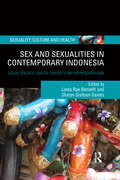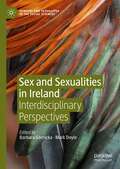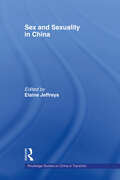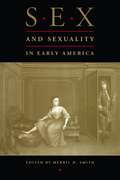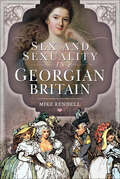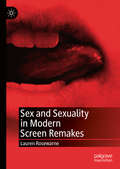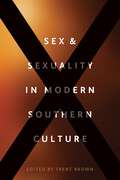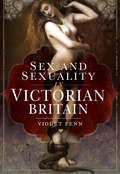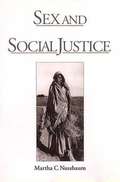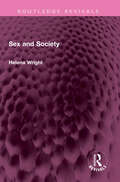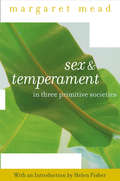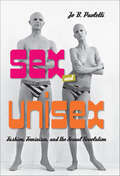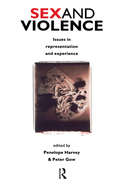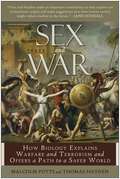- Table View
- List View
Sex and Real Estate: Why We Love Houses
by Marjorie GarberSex and Real Estateis a witty, informative, and thought-provoking study of our complex relation to the ideas and actualities of house and home. With vast erudition lightly carried, Marjorie Garber — professor of English and director of the Humanities Center at Harvard University — ranges through literature, art, film, journalism, criticism, and the hard evidence of everyday experience, and gives us an acute analysis of the ways in which we think about the places we hang our hats. She discusses the House as Beloved ("Your house is the other person in your life," declares an architectural designer. ), as Mother ("The house, we would like to think, loves us. "), as Body ("both an ancient figure and a persistent desire"). She writes about the Dream House, the Trophy House ("We could call the purchasers of celebrity homes 'house-groupies. '"), the House as History, and the Summer House ("When you're seventeen, you dream of a summer romance. When you're forty-seven, you dream of a summer home. "). Each chapter is a superb, individually constructed essay. Taken together, they add up to an enlightening and challenging exploration of one of the most familiar — but also most emotionally charged — elements of our lives.
Sex and Relationships Education: A Step-by-Step Guide for Teachers (Spotlight Ser.)
by Simon BlakeThis book will enable and assist teachers responsible for organizing and delivering Sex and Relationships Education. It draws together the best available practice to support teachers in developing policy and classroom practice. It begins by looking at general principles and then focuses on primary, secondary and special schools as well as pupil referral units. These chapters will provide a toolkit of ideas and approaches that teachers can use in the classroom. Included are practical exercises that can be done alone or in staff meetings to prepare yourself or a colleague to deliver SRE, a glossary of terms that will support you in answering children's and young people's questions, advice on choosing, developing and using resources, and a list of useful organizations and websites. The book will be particularly helpful to PSHE coordinators, Health Promotion Units, National Healthy School Standard coordinators and SRE teachers in schools. LEA Advisors and Inspectors, and anyone involved in training and supporting teachers, will also find this a useful guide.
Sex and Repression in Savage Society: [1927] (Routledge Classics Ser.)
by Bronislaw MalinowskiThis volume explores and challenges the applicatio psychoanalytic theory to the study of traditional societies.
Sex and Repression in Savage Society: [1927] (Routledge Classics)
by Bronislaw MalinowskiDuring the First World War the pioneer anthropologist Bronislaw Malinowski found himself stranded on the Trobriand Islands, off the eastern coast of New Guinea. By living among the people he studied there, speaking their language and participating in their activities, he invented what became known as 'participant-observation'. This new type of ethnographic study was to have a huge impact on the emerging discipline of anthropology. In Sex and Repression in Savage Society Malinowski applied his experiences on the Trobriand Islands to the study of sexuality, and the attendant issues of eroticism, obscenity, incest, oppression, power and parenthood. In so doing, he both utilized and challenged the psychoanalytical methods being popularized at the time in Europe by Freud and others. The result is a unique and brilliant book that, though revolutionary when first published, has since become a standard work on the psychology of sex.
Sex and Rockets
by Robert Anton Wilson John CarterThis remarkable true story about the co-founder of Jet Propulsion Laboratory. By day, Parsons' unorthodox genius created a solid rocket fuel that helped the Allies win World War II. By night, Parsons called himself The Antichrist. "One of the best books of the year."--The Anomalist
Sex and Secularism
by Joan Wallach ScottHow secularism has been used to justify the subordination of womenJoan Wallach Scott’s acclaimed and controversial writings have been foundational for the field of gender history. With Sex and Secularism, Scott challenges one of the central claims of the “clash of civilizations” polemic—the false notion that secularism is a guarantee of gender equality.Drawing on a wealth of scholarship by second-wave feminists and historians of religion, race, and colonialism, Scott shows that the gender equality invoked today as a fundamental and enduring principle was not originally associated with the term “secularism” when it first entered the lexicon in the nineteenth century. In fact, the inequality of the sexes was fundamental to the articulation of the separation of church and state that inaugurated Western modernity. Scott points out that Western nation-states imposed a new order of women’s subordination, assigning them to a feminized familial sphere meant to complement the rational masculine realms of politics and economics. It was not until the question of Islam arose in the late twentieth century that gender equality became a primary feature of the discourse of secularism.Challenging the assertion that secularism has always been synonymous with equality between the sexes, Sex and Secularism reveals how this idea has been used to justify claims of white, Western, and Christian racial and religious superiority and has served to distract our attention from a persistent set of difficulties related to gender difference—ones shared by Western and non-Western cultures alike.
Sex and Sensibility: Stories of a Lesbian Generation
by Arlene SteinIn the first book to analyze shifts in lesbian identity, consciousness, and culture from the 1970s to the 1990s, Arlene Stein contributes an important chapter to the study of the women's movement and offers a revealing portrait of the exchange between a radical generation of feminists and its successors. Tracing the evolution of the lesbian movement from the bar scene to the growth of alternative families, Stein illustrates how a generation of women transformed the woman-centered ideals of feminism into a culture and a lifestyle.Sex and Sensibility relates the development of a "queer" sensibility in the 1990s to the foundation laid by the gay rights and feminist movements a generation earlier. Beginning with the stories of thirty women who came of age at the climax of the 70s women's movement—many of whom defined lesbianism as a form of resistance to dominant gender and sexual norms—Stein explores the complex issues of identity that these women confronted as they discovered who they were and defined themselves in relation to their communities and to society at large.Sex and Sensibility ends with interviews of ten younger women, members of the post-feminist generation who have made it a fashion to dismiss lesbian feminism as overly idealistic and reductive. Enmeshed in Stein's compelling and personal narrative are coming-out experiences, questions of separatism, work, desire, children, and family. Stein considers the multiple identities of women of color and the experiences of intermittent and "ex" lesbians.Was the lesbian feminist experiment a success? What has become of these ideas and the women who held them? In answering these questions, Stein illustrates the lasting and profound effect that the lesbian feminist movement had, and continues to have, on contemporary women's definitions of sexual identity.
Sex and Sexualities in Contemporary Indonesia: Sexual Politics, Health, Diversity and Representations (Sexuality, Culture and Health)
by Linda Rae Bennett Sharyn Graham DaviesWinner of the 2015 Ruth Benedict Prize for Outstanding Edited Volume Sex, sexuality and sexual relationships are hotly debated in Indonesia, triggering complex and often passionate responses. This innovative volume explores these issues in a variety of ways. It highlights historical and newer forms of sexual diversity, as well as the social responses they provoke. It critiques differing representations of sexuality, pointing to the multiplicity of discourses within which sexuality and ‘the sexual’ are understood in modern-day Indonesia. Placing sexuality centre-stage and locating it within the specific historical context of the Reformasi era, this landmark volume explores understandings and practices across a wide variety of sites, focusing in on a diverse group of Indonesian actors, and the contested meanings that sexuality carries. Beginning with a substantive introduction and concluding with a scholarly reflection on key issues, the volume is framed around the four themes of sexual politics, health, diversity and representations. It seeks both to present new empirical findings as well as to add to existing theoretical analysis. This work fills an important gap in our understanding of the evolution and contemporary dynamics of Indonesian sexualities. It will be of interest to scholars and academics from disciplines including gender and sexuality studies, global health, sexual and reproductive health, anthropology, sociology and Asian studies.
Sex and Sexualities in Ireland: Interdisciplinary Perspectives (Genders and Sexualities in the Social Sciences)
by Mark Doyle Barbara GórnickaThis edited collection provides an invaluable resource of seventeen chapters from a wide range of academic disciplines. These chapters place sex and sexualities in Ireland in historical context and take the reader through the structural changes that have transformed the expression of sexuality in Ireland from one of self-denial to self-expression. The collection does not however unquestionably assume a linear narrative of progress: new issues and challenges are also addressed throughout. This book will be of interest to students and scholars from a range of disciplines including sociology, social policy, history, media, gender studies and psychology. The collection is divided into six separate but interlinked thematic sections: Sexualities in Historical Irish Contexts, Young Adults, Sexual Health, and Education, Sexual Practices and Health, Minority Sexualities and Genders, Sex Work in Ireland and Activism and Contestation.
Sex and Sexuality in China (Routledge Studies on China in Transition)
by Elaine JeffreysElaine Jeffreys explores the issues of sex and sexuality in a non-Western context by examining debates surrounding the emergence of new sexual behaviours, and the appropriate nature of their regulation, in the People's Republic of China. Commissioned from Western and mainland Chinese scholars of sex and sexuality in China, the chapters in this volume are marked by a diversity of subject material and theoretical perspectives, but turn on three related concerns. First, the book situates China’s changing sexual culture and the nature of its governance in the socio-political history of the PRC. Second, it shows how China’s shift to a rule of law has generated conflicting conceptions of citizenship and the associated rights of individuals as sexual citizens. Finally, the book demonstrates that the Chinese state does not operate strictly to repress ‘sex’; it also is implicated in the creation of new spaces for sexual entrepreneurship, expertise and consumption. This comprehensive study is a valuable resource for scholars in the fields of sexuality studies and post-socialist societies and culture, directly appealing to both East Asia and China specialists.
Sex and Sexuality in Early America
by Merril D SmithWhat role did sexual assault play in the conquest of America? How did American attitudes toward female sexuality evolve, and how was sexuality regulated in the early Republic? Sex and sexuality have always been the subject of much attention, both scholarly and popular. Yet, accounts of the early years of the United States tend to overlook the importance of their influence on the shaping of American culture. Sex and Sexuality in Early America addresses this neglected topic with original research covering a wide spectrum, from sexual behavior to sexual perceptions and imagery. Focusing on the period between the initial contact of Europeans and Native Americans up to 1800, the essays encompass all of colonial North America, including the Caribbean and Spanish territories. Challenging previous assumptions, these essays address such topics as rape as a tool of conquest; perceptions and responses to Native American sexuality; fornication, bastardy, celibacy, and religion in colonial New England; gendered speech in captivity narratives; representations of masculinity in eighteenth- century seduction tales, the sexual cosmos of a southern planter, and sexual transgression and madness in early American fiction. The contributors include Stephanie Wood, Gordon Sayre, Steven Neuwirth, Else L. Hambleton, Erik R. Seeman, Richard Godbeer, Trevor Burnard, Natalie A. Zacek, Wayne Bodle, Heather Smyth, Rodney Hessinger, and Karen A. Weyler.
Sex and Sexuality in Georgian Britain
by Mike Rendell“A thorough examination of the morals and mindset of Georgian Britons towards sex and sexuality . . . well-written, engaging and educational.” —Caitlyn Lynch, USA Today-bestselling authorPeek beneath the bedsheets of eighteenth- and early nineteenth-century Britain in this affectionate, informative and fascinating look at sex and sexuality during the reigns of Georges I-IV. It examines the prevailing attitudes towards male and female sexual behavior, and the ways in which these attitudes were often determined by those in positions of power and authority. It also explores our ancestors’ ingenious, surprising, bizarre and often entertaining solutions to the challenges associated with maintaining a healthy sex life.Did the people in Georgian Britain live up to their stereotypes when it came to sexual behavior? This book will answer this question, as well as looking at fashion, food, science, art, medicine, magic, literature, love, politics, faith and superstition through a new lens, leaving the reader enlightened and with a new regard for the ingenuity and character of our ancestors.“This book was funny, at times, and for a slim volume is quite comprehensive . . . Good introduction to the period, very easy to read and entertaining.” —Rosie Writes . . .
Sex and Sexuality in Modern Screen Remakes
by Lauren RosewarneSex and Sexuality in Modern Screen Remakes examines how sexiness, sexuality and revisited sexual politics are used to modernize film and TV remakes. This exploration provides insight into the ever-evolving—and ever-contested—role of sex in society, and scrutinizes the politics and economics underpinning modern media reproduction. More nudity, kinky sex, and queer content are increasingly deployed in remakes to attract, and to titillate, a new generation of viewers. While sex in this book refers to increased erotic content, this discussion also incorporates an investigation of other uses of sex and gender to help a remake appear woke and abreast of the zeitgeist including feminist reimaginings and ‘girl power’ make-overs, updated gender roles, female cast-swaps, queer retellings, and repositioned gazes. Though increased sex is often considered a sign of modernity, gratuitous displays of female nudity can sometimes be interpreted as sexist and anachronistic, in turn highlighting that progressiveness around sexuality in contemporary media is not a linear story. Also examined therefore, are remakes that reduce the sexual content to appear cutting-edge and cognizant of the demands of today’s audiences.
Sex and Sexuality in Modern Southern Culture
by Whitney Strub Claire Strom Matt Miller Trent Brown Jerry Watkins Stephanie Chalifoux Francesca Gamber Richard Hourigan Riche Richardson Katherine Henninger Abigail Parsons Krystal HumphreysIn the American imagination, the South is a place both sexually open and closed, outwardly chaste and inwardly sultry. Sex and Sexuality in Modern Southern Culture demonstrates that there is no central theme that encompasses sex in the U.S. South, but rather a rich variety of manifestations and embodiments influenced by race, gender, history, and social and political forces.The twelve essays in this volume shine a particularly bright light on the significance of race in shaping the history of southern sexuality, primarily in the period since World War II. Francesca Gamber discusses the politics of interracial sex during the national civil rights movement, while Katherine Henninger and Riché Richardson each consider the intersections of race and sexuality in the blaxploitation film Mandingo and the comedy of Steve Harvey, respectively. Political and religious regulation of sexual behavior also receives attention in Claire Strom’s essay on venereal disease treatment in wartime Florida, Stephanie M. Chalifoux’s examination of prostitution networks in Alabama, Krystal Humphreys’s piece on purity culture in modern Christianity, and Whitney Strub’s essay delving into the sexual politics of the Memphis Deep Throat trials. Specific places in the South figure prominently in Jerry Watkins’s essay on queer sex in the Redneck Riviera of northern Florida, Richard Hourigan’s exploration of bachelor parties in Myrtle Beach, and Matt Miller’s piece on African American spring break celebrations in Atlanta. Finally, Abigail Parsons and Trent Brown investigate southern portrayals of gender and sexuality in the fiction of Fannie Flagg and Larry Brown.Above all, Sex and Sexuality in Modern Southern Culture demonstrates that sex has been a fluid and resilient force operating across multiple discourses and practices in the contemporary South, and remains a vital component in the perception of a culturally complex region.
Sex and Sexuality in Stuart Britain
by Andrea ZuvichAn expert in Stuart England examines the sexual lives of Britons in the seventeenth and early eighteenth centuries in this frank, informative, and revealing history.Acclaimed Stuart historian Andrea Zuvich explores the sexual mores of Stuart Britain, including surprising beliefs, bizarre practices, and ingenious solutions for infertility, impotence, sexually transmitted diseases, and more. Along the way, she reveals much about the prevailing attitudes towards male and female sexual behavior.Zuvich sheds light not only on the saucy love lives of the Royal Stuarts, but also on the dark underbelly of the Stuart era with histories of prostitution, sexual violence, infanticide, and sexual deviance. She looks at everything from what was considered sexually attractive to the penalties for adultery, incest, and fornication.Sex and Sexuality in Stuart Britain touches on the fashion, food, science, art, medicine, magic, literature, love, politics, faith and superstition of the day.
Sex and Sexuality in Victorian Britain
by Violet Fenn&“Dull this book is not, and it gives an insight into the many scandals not spoken about in polite Victorian drawing rooms.&” —Glasgow & West of Scotland Family History Society Peek beneath the bedsheets of nineteenth-century Britain in this affectionate, informative and fascinating look at sex and sexuality during the reign of Queen Victoria. It examines the prevailing attitudes towards male and female sexual behavior, and the ways in which these attitudes were often determined by those in positions of power and authority. It also explores our ancestors&’ ingenious, surprising, bizarre and often entertaining solutions to the challenges associated with maintaining a healthy sex life. Did the people in Victorian times live up to their stereotypes when it came to sexual behavior? This book will answer this question, as well as looking at fashion, food, science, art, medicine, magic, literature, love, politics, faith and superstition through a new lens, leaving the reader uplifted and with a new regard for the ingenuity and character of our great-great-grandparents. &“I would say this book gives you the information on relationships, genders and very much behavior that doesn&’t usually come across in history books. Therefore this is an excellent book indeed, certainly one that more people should be aware of and learn from.&” —UK Historian &“The writing is joyous and it is clear the author enjoys her subject and is fairly knowledgeable on things Victorian.&” —Rosie Writes &“Fenn&’s writing is so readable and it&’s clear this is a book written by a historian who loves her subject and is very knowledgeable about the research being carried out by other historians.&” —Jessticulates
Sex and Sexuality in Victorian Britain
by Violet Fenn&“Dull this book is not, and it gives an insight into the many scandals not spoken about in polite Victorian drawing rooms.&” —Glasgow & West of Scotland Family History Society Peek beneath the bedsheets of nineteenth-century Britain in this affectionate, informative and fascinating look at sex and sexuality during the reign of Queen Victoria. It examines the prevailing attitudes towards male and female sexual behavior, and the ways in which these attitudes were often determined by those in positions of power and authority. It also explores our ancestors&’ ingenious, surprising, bizarre and often entertaining solutions to the challenges associated with maintaining a healthy sex life. Did the people in Victorian times live up to their stereotypes when it came to sexual behavior? This book will answer this question, as well as looking at fashion, food, science, art, medicine, magic, literature, love, politics, faith and superstition through a new lens, leaving the reader uplifted and with a new regard for the ingenuity and character of our great-great-grandparents. &“I would say this book gives you the information on relationships, genders and very much behavior that doesn&’t usually come across in history books. Therefore this is an excellent book indeed, certainly one that more people should be aware of and learn from.&” —UK Historian &“The writing is joyous and it is clear the author enjoys her subject and is fairly knowledgeable on things Victorian.&” —Rosie Writes &“Fenn&’s writing is so readable and it&’s clear this is a book written by a historian who loves her subject and is very knowledgeable about the research being carried out by other historians.&” —Jessticulates
Sex and Social Justice
by Martha C. NussbaumWhat does it mean to respect the dignity of a human being? What sort of support do human capacities demand from the world, and how should we think about this support when we encounter differences of gender or sexuality? How should we think about each other across divisions that a legacy of injustice has created? In Sex and Social Justice, Martha Nussbaum delves into these questions and emerges with a distinctive conception of feminism that links feminist inquiry closely to the important progress that has been made during the past few decades in articulating theories of both national and global justice. Growing out of Nussbaum's years of work with an international development agency connected with the United Nations, this collection charts a feminism that is deeply concerned with the urgent needs of women who live in hunger and illiteracy, or under unequal legal systems. Offering an internationalism informed by development economics and empirical detail, many essays take their start from the experiences of women in developing countries. Nussbaum argues for a universal account of human capacity and need, while emphasizing the essential role of knowledge of local circumstance. Further chapters take on the pursuit of social justice in the sexual sphere, exploring the issue of equal rights for lesbians and gay men. Nussbaum's arguments are shaped by her work on Aristotle and the Stoics and by the modern liberal thinkers Kant and Mill. She contends that the liberal tradition of political thought holds rich resources for addressing violations of human dignity on the grounds of sex or sexuality, provided the tradition transforms itself by responsiveness to arguments concerning the social shaping of preferences and desires. She challenges liberalism to extend its tradition of equal concern to women, always keeping both agency and choice as goals. With great perception, she combines her radical feminist critique of sex relations with an interest in the possibilities of trust, sympathy, and understanding. Sex and Social Justice will interest a wide readership because of the public importance of the topics Nussbaum addresses and the generous insight she shows in dealing with these issues. Brought together for this timely collection, these essays, extensively revised where previously published, offer incisive political reflections by one of our most important living philosophers.
Sex and Society (Routledge Revivals)
by Helena WrightFirst published in 1968, Sex and Society presents and analyses the code of sexual behaviour based on the universal use of contraceptive methods. It includes discussion of all forms of sexual activity, and emphasises in particular the attitudes that should be adopted in sex education. Backed up by case histories, and including details of reforms in abortion and homosexual law, this book sheds light on a topic which continues to cause concern in modern times. The author had been in active contact with all kinds of sexual problems for over thirty years in her professional clinic practice, and in her travels in India, Poland and Denmark teaching contraceptive techniques to doctors and nurses. Her experience as a Founder Member of the International Planned Parenthood Federation and participation in all the International and Regional Conferences gave her a very wide knowledge of sexual and social problems throughout the world. This book will be of interest to students of medicine, sexuality studies, psychology, gender studies, and health.
Sex and Temperament
by Margaret MeadFirst published in 1935, Sex & Temperament is a fascinating and brilliant anthropological study of the intimate lives of three New Guinea tribes from infancy to adulthood. Focusing on the gentle, mountain-dwelling Arapesh, the fierce, cannibalistic Mundugumor, and the graceful headhunters of Tchambuli -- Mead advances the theory that many so-called masculine and feminine characteristics are not based on fundamental sex differences but reflect the cultural conditioning of different societies. This edition, prepared for the centennial of Mead's birth, features introductions by Helen Fisher and Mead's daughter, Mary Catherine Bateson.A precursor to Mead's illuminating Male & Female, Sex & Temperament lays the groundwork for her lifelong study of gender differences.
Sex and Temperament in Three Primitive Societies
by Margaret MeadMargaret Mead's analysis of sex and gender from anthropological research in three New Guinea tribes.
Sex and Tourism: Journeys of Romance, Love, and Lust
by Thomas Bauer Bob Mckercher Kaye Sung ChonExplore the complex relationship between tourism and intimacy in this new book with a worldwide perspective! With a unique combination of academic and personal accounts, Sex and Tourism: Journeys of Romance, Love, and Lust takes you behind the scenes with motel owners, adventure travel guides, backpackers, and others working on all sides of the international tourism industry. The editors have created a model that views the situation from three different perspectives: tourist, tourism provider, and nature of the encounter. Unlike other related volumes, this book is not just about the sex trade, but also about the role of tourism in love, marriage, and relationships. The global focus of Sex and Tourism will introduce you to: off-season romance on the island of Crete sex tourism in Cambodia a South Korean museum dedicated to women forced into sexual slavery by the Japanese military the sexual aspects of adventure travel in Canada cross-cultural marriage in Thailand gentleman's clubs in New Orleans Australian river guides and their potential liaisons with clients People who travel to escape their day-to-day lives often become involved in situations they would never find themselves in at home. Good or bad, many of these situations are examined in Sex and Tourism. You'll learn about the illegal trafficking of girls in Nepal, worldwide programs for combating child sex rings, and the lethal combination of AIDS and tourism, but you'll also find accounts of love and romance far from home. You will see how the tourism industry can act as a facilitator of human intimacy and what happens when different cultural realities collide. Anyone involved in recreation, leisure, anthropology, social science, or tourism will be interested in this book. Sex and Tourism is an enlightening guide to the complex world found at the crossroads of sightseeing and sex.
Sex and Unisex: Fashion, Feminism, and the Sexual Revolution
by Jo B. PaolettiNotorious as much for its fashion as for its music, the 1960s and 1970s produced provocative fashion trends that reflected the rising wave of gender politics and the sexual revolution. In an era when gender stereotypes were questioned and dismantled, and when the feminist and gay rights movements were gaining momentum and a voice, the fashion industry responded in kind. Designers from Paris to Hollywood imagined a future of equality and androgyny. The unisex movement affected all ages, with adult fashions trickling down to school-aged children and clothing for infants. Between 1965 and 1975, girls and women began wearing pants to school; boys enjoyed a brief "peacock revolution," sporting bold colors and patterns; and legal battles were fought over hair style and length. However, with the advent of Diane Von Furstenberg's wrap dress and the launch of Victoria's Secret, by the mid-1980s, unisex styles were nearly completely abandoned. Jo B. Paoletti traces the trajectory of unisex fashion against the backdrop of the popular issues of the day—from contraception access to girls' participation in sports. Combing mass-market catalogs, newspaper and magazine articles, cartoons, and trade publications for signs of the fashion debates, Paoletti provides a multigenerational study of the "white space" between (or beyond) masculine and feminine.
Sex and Violence: The Psychology of Violence and Risk Assessment
by Penelope HarveyProduced in response to the growing international demand for information, this book details the latest research in understanding and controlling violent and sexual offences. Increasing numbers of psychologists are now studying and working with offenders to the advancement of forensic psychology.Chapters cover contributions from ten different countries and are grouped into three sections dealing with risk assessment, sex offenders and offences and violent offenders and offences. The first section discusses the progress that has been made towards making accurate decisions about the risk that an individual poses to the community and emphasises the need to draw on both clinical experience and research.The second section explores understandings and investigations of sexual offences including discussion on: American commitment laws for sexually violent predators; the status of "recovered memories" in criminal trials; factors influencing delays in reporting sexual abuse; a model of rapists' accounts of their offences; and situational factors in sexual offending.The final section on violent offenders and offences includes discussion on: criminal careers; domestic violence; mutiliation-murder in Japan; offender profiling; and sentencing of homicide cases.This book will be of interest to scholars in criminology, psychology and forensic psychiatry and to policy-makers and practitioners who deal with sexual and violent offences.
Sex and War: How Biology Explains Warfare and Terrorism and Offers a Path to a Safer World
by Thomas Hayden Malcolm PottsAs news of war and terror dominates the headlines, scientist Malcolm Potts and veteran journalist Thomas Hayden take a step back to explain it all. In the spirit of Guns, Germs and Steel, Sex and War asks the basic questions: Why is war so fundamental to our species? And what can we do about it? Malcolm Potts explores these questions from the frontlines, as a witness to war-torn countries around the world. As a scientist and obstetrician, Potts has worked with governments and aid organizations globally, and in the trenches with women who have been raped and brutalized in the course of war. Combining their own experience with scientific findings in primatology, genetics, and anthropology, Potts and Hayden explain war's pivotal position in the human experience and how men in particular evolved under conditions that favored gang behavior, rape, and organized aggression. Drawing on these new insights, they propose a rational plan for making warfare less frequent and less brutal in the future. Anyone interested in understanding human nature, warfare, and terrorism at their most fundamental levels will find Sex and War to be an illuminating work, and one that might change the way they see the world.
